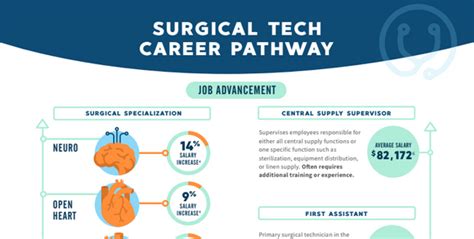The medical field offers a wide range of career opportunities for individuals who are passionate about helping others and making a difference in their lives. Two popular career paths in the medical field are Registered Nurse (RN) and Surgical Technologist (Surgical Tech). While both careers are rewarding and challenging, they have distinct differences in terms of job responsibilities, education requirements, and work environment.
Job Responsibilities

Registered Nurses (RNs) play a vital role in the healthcare system, providing hands-on care to patients, administering medications, and developing care plans. They work closely with physicians, therapists, and other healthcare professionals to ensure that patients receive comprehensive care. RNs can work in various settings, including hospitals, clinics, nursing homes, and community health organizations.
Surgical Technologists, on the other hand, are responsible for preparing operating rooms, maintaining a sterile environment, and assisting surgeons and other medical professionals during surgical procedures. They also prepare patients for surgery, ensure that all necessary equipment is available, and maintain accurate records of surgical procedures.
Key Responsibilities of RNs:
- Assess patient conditions and develop care plans
- Administer medications and treatments
- Monitor patient progress and adjust care plans as needed
- Educate patients and their families about healthy habits and disease prevention
- Collaborate with other healthcare professionals to ensure comprehensive care
Key Responsibilities of Surgical Techs:
- Prepare operating rooms and maintain a sterile environment
- Assist surgeons and other medical professionals during surgical procedures
- Prepare patients for surgery and ensure that all necessary equipment is available
- Maintain accurate records of surgical procedures
- Clean and disinfect equipment and operating rooms
Education and Training

Registered Nurses typically require a Bachelor's degree in nursing (BSN) or an Associate's degree in nursing (ADN). Many RNs also pursue certifications in specialized areas, such as pediatrics, gerontology, or oncology. RNs must pass the National Council Licensure Examination (NCLEX-RN) to become licensed.
Surgical Technologists typically require a post-secondary certificate or diploma in surgical technology. Many programs are accredited by the Commission on Accreditation of Allied Health Education Programs (CAAHEP). Surgical Techs must pass the Certified Surgical Technologist (CST) exam to become certified.
Education Requirements for RNs:
- Bachelor's degree in nursing (BSN) or Associate's degree in nursing (ADN)
- Completion of a nursing program accredited by the Accreditation Commission for Education in Nursing (ACEN)
- Passage of the National Council Licensure Examination (NCLEX-RN)
Education Requirements for Surgical Techs:
- Post-secondary certificate or diploma in surgical technology
- Completion of a program accredited by the Commission on Accreditation of Allied Health Education Programs (CAAHEP)
- Passage of the Certified Surgical Technologist (CST) exam
Work Environment

Registered Nurses work in a variety of settings, including hospitals, clinics, nursing homes, and community health organizations. They may work in pediatrics, gerontology, oncology, or other specialized areas.
Surgical Technologists work primarily in operating rooms and surgical suites. They may work in hospitals, outpatient surgery centers, or physician's offices.
Work Environment for RNs:
- Hospitals
- Clinics
- Nursing homes
- Community health organizations
- Specialized areas, such as pediatrics or oncology
Work Environment for Surgical Techs:
- Operating rooms
- Surgical suites
- Hospitals
- Outpatient surgery centers
- Physician's offices
Salary and Job Outlook

According to the Bureau of Labor Statistics (BLS), the median salary for Registered Nurses is around $76,840 per year. The job outlook for RNs is expected to grow 12% from 2020 to 2030, which is faster than the average for all occupations.
The median salary for Surgical Technologists is around $48,330 per year. The job outlook for Surgical Techs is expected to grow 3% from 2020 to 2030, which is slower than the average for all occupations.
Salary Ranges for RNs:
- Entry-level: around $60,000 per year
- Experienced: around $80,000 per year
- Senior-level: around $100,000 per year
Salary Ranges for Surgical Techs:
- Entry-level: around $40,000 per year
- Experienced: around $50,000 per year
- Senior-level: around $60,000 per year
Conclusion
Both Registered Nurses and Surgical Technologists play critical roles in the healthcare system. While both careers are rewarding and challenging, they have distinct differences in terms of job responsibilities, education requirements, and work environment. RNs provide hands-on care to patients, administer medications, and develop care plans, while Surgical Techs prepare operating rooms, maintain a sterile environment, and assist surgeons and other medical professionals during surgical procedures.
Ultimately, the choice between a career as an RN or Surgical Tech depends on individual preferences and goals. If you enjoy working closely with patients and developing care plans, a career as an RN may be the right choice. If you prefer working in a fast-paced environment and assisting surgeons and other medical professionals during surgical procedures, a career as a Surgical Tech may be the right choice.






What is the difference between a Registered Nurse and a Surgical Technologist?
+Registered Nurses provide hands-on care to patients, administer medications, and develop care plans, while Surgical Technologists prepare operating rooms, maintain a sterile environment, and assist surgeons and other medical professionals during surgical procedures.
What education and training do I need to become a Registered Nurse?
+Registered Nurses typically require a Bachelor's degree in nursing (BSN) or an Associate's degree in nursing (ADN). Many RNs also pursue certifications in specialized areas.
What is the job outlook for Surgical Technologists?
+The job outlook for Surgical Technologists is expected to grow 3% from 2020 to 2030, which is slower than the average for all occupations.
